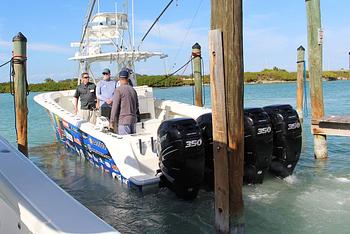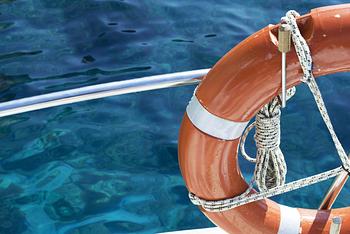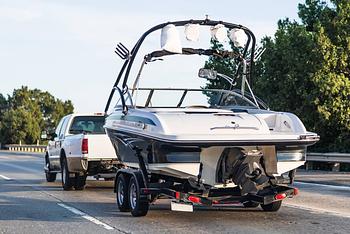Love it or hate it, staying connected has become a part of modern life—especially if you plan on doing business from your boat—and these days many people consider having boat internet a must. But tapping into the internet at sea is easier said than done. Service can get sketchy and connections can get iffy once you’re off the dock. And while there are solutions that cover all the bases, the more complex your system gets the more it will cost to purchase the hardware and maintain the dataflow.

How to Get Internet on a Boat at Sea
The words “at sea” have different meanings for different boaters, ranging from jaunts across the lake or bay to trans-oceanic voyages. So for right now, we’ll define it as simply being off of the dock in any open waterway. Depending on just how far-flung your boating adventures will be, that leaves a number of options including:
- WiFi for boats
- Marine Cellular Service Systems
- Marine Satellite Internet Service
These are listed in order of range and effectiveness, which unsurprisingly also corresponds with cost. A Wifi link can be enjoyed on a boat up to several miles from the hotspot via an extender, which usually consists of a special antenna or antennas that boost weak signals and can maintain a connection after your boat leaves the harbor. Most manufacturers claim a maximum range of five to seven miles, and all caution that the exact range will vary depending on environmental conditions. Cellular systems take that range out to around 20 miles, though again, this will vary depending on location and conditions. And satellite service can quite literally cover the globe.
Cost of Boat Internet
The cost of boat internet will vary wildly—all the way from free, to tens of thousands of dollars for hardware and thousands of dollars a month in service fees. As you might guess, the farther from shore you go and the faster speeds you want, the more you’ll pay. To a large extent the cost scale will vary by where you do your boating, so we’ll break down both cost and service options by offshore, coastal, and marinas or harbors.
Offshore internet on a boat
For the purposes of defining “offshore,” we’ll stick to the 20-plus miles from shore parameter. That means the lower-cost options of WiFi and cellular service are off the table, and marine satellite internet is the only reliable option.
Setting up a satellite service system on a boat is no easy task and will be quite expensive. You’ll need an antenna, a belowdeck hub, and all the wiring that gets routed between them. Forget about making this a DIY project—it requires professional installation, period. And that will cost you plenty, though probably not as much as a $10,000 (or more) satellite antenna and a service plan that can range all the way from $150 a month to $2,000 a month depending on if it’s unlimited or metered data. Note that some of the top satellite antenna manufacturers, like KVH, offer antenna that can switch between satellite and cellular service depending upon availability to reduce service costs.
The newest satellite option out there is Starlink Maritime, which is advertising significantly lower cost hardware ($2,500 for the antenna) and what seems like a reasonable spectrum of service plans ($250/month for 50GB, $1,000 a month for 1TB, $5,000/month for 5TB). However, this service is extremely new (approval was just granted by the FCC in June of 2022), pricing and service changes can take place at a rapid clip, and there are large gaps in coverage areas including in the open ocean. For now this service probably isn’t the one of choice for long-distance cruisers, but it’s time is coming, and coming rapidly.

Sixty Starlink satellites are stacked prior to deployment. Photo credit: Starlink
Coastal internet on a boat
For the majority of the cruising boaters out there getting marine internet boils down to some form of cellular connection. Most of us stay within cell range most of the time, and the cost factor will make satellite service prohibitive anyway.
What about making a WiFi hotspot with your cell phone? That will work at some times in some places, but it’s not terribly reliable. In many areas cell service on boats is sketchy without specialized gear in the first place, because most cell coverage is oriented to land use as opposed to use out on the water.
A better option is a dedicated cellular-based service. In many situations, you can get away with using a portable “MiFi” (mobile WiFi) router or Jetpack, which provides a stronger signal than a cell phone hotspot, allows connecting multiple devices, and generally provides better service all the way around. These tend to cost a few hundred dollars and need to have their own dedicated data plan, which isn’t much different than having a regular cell phone plan. As for range and coverage, it can vary quite a bit depending on where you do your boating. As a rule it will be better than regular cell coverage and sometimes substantially so, but all bets are off as to exact distances.
Better yet is a dedicated 4G, 5G, or LTE-A coastal internet system. These consist of a dome that has multiple antennae inside, a router either in the antennae itself or wired in belowdecks, SIM cards, and the software to juggle between different cellular systems to maintain the best possible service. Most advertise a maximum range of 20 miles from the coast, but exact range is variable depending on conditions and antenna mounting height and location. Price ranges from slightly under $1,000 to several thousand dollars; you can expect data to cost around $100 per 10 GB/month but note that plans vary by provider.

Shakespeare Stream wireless booster. Photo credit: Shakespeare Marine
Internet at marinas and harbors
Most midsize and larger marinas are wired to provide WiFi for boats these days, and sometimes you can find a public WiFi link in major harbors in metropolitan areas. That said, coverage is often spotty and may be weak. If getting WiFi to your computer while at the dock is your main interest, you may or may not need any special gear to do so depending on local availability. But if you find dropped signals and spotty service annoying, you may want to try a simple plug-in portable extender. Inexpensive models costing $100 or less generally boost range to two to four times that of the normal range of a computer’s built-in WiFi receiver and plug directly into the computer via a USB. A few claim to be marinized but be sure to check for IP ratings. Since these are relatively inexpensive it’s not too painful to give one a shot before moving up to a fixed-mount extender connected to a router, if need be.
Marine extender/router units designed specifically to deliver boat internet functionality do cost substantially more than portable plug-ins and can run from $500 or so to over $1000. However, they also provide significantly better functionality, with the ability to connect multiple devices. Advertised ranges are commonly from three to seven miles but exact range will depend on a number of factors including atmospheric conditions and signal strength.
High Speed Internet for Boats
The “official” definition of high-speed internet in the U.S. is a download speed 25 Mbps of faster. As to getting this sort of performance on a boat, it depends entirely on where you are, which type of system you’re using, and what’s going on around you — at some times in some places you may be able to enjoy it without any special gear via your own marina’s system while sitting at the dock, but on a busy weekend when lots of people are tapping into the signal it may be a completely different story.
When using WiFi at sea, even the best systems often can’t perform at this level. Most also have very different download and upload speeds, and sometimes upload speed can be a tenth of downloading. And on top of that, in many cases speeds will be at the mercy of multiple variables, just as range is. So, while you may be able to enjoy true high-speed internet for boats at one time or another, this isn’t a functionality you should bank on.
Best Internet Systems for Boats
So, which of these are the best internet systems for boats? All of them, and none of them. Each different option fills a different niche, and any one of them might be “best” for you, personally, depending on where and how you do your boating. That said, one thing is for sure: thanks to modern technology, today it’s easier than ever before to stay connected while afloat.
Related Articles and Guides
18th Jun 2024
How to Dock a Boat with Joysticks, Single Engines, and Twins: Tips and Technique...
20th May 2024
Essential Boat Safety Tips for Every Type of Watercraft
29th Mar 2024
How to Transport Your Boat Four Different Ways
18th Oct 2023





